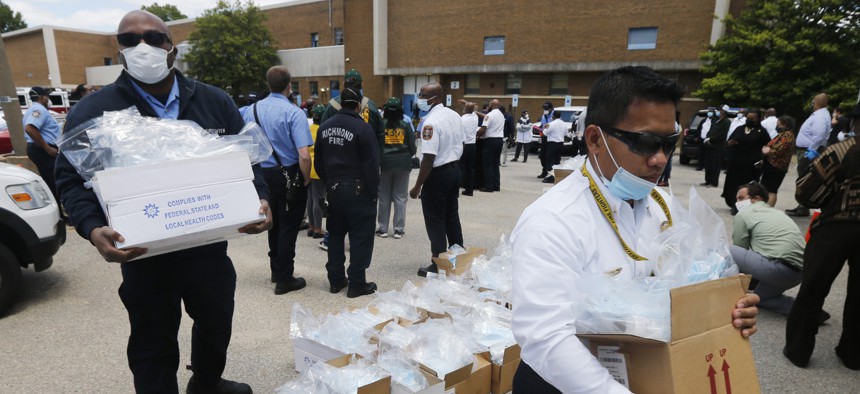Virginia Strives to Weave Health Equity Into Its Coronavirus Response

Volunteer firefighters load boxes of personal protective equipment during a health equity community event Tuesday May 12, 2020, in Richmond, Va. AP Photo/Steve Helber
The state’s Health Equity Leadership Task Force is pursuing partnerships with local governments in order to get protective gear and information about the virus to minority communities.
The coronavirus outbreak has disproportionately struck minority communities, and Richmond, Virginia is no exception.
Of the 29 people who died and 200 people hospitalized in the city due to coronavirus, African Americans accounted for 22 deaths and 107 hospitalizations despite being 48% of the city’s population, according to data from the Virginia Department of Health.
To address the disparities and try to ensure communities of color received adequate healthcare resources and education, the state’s Health Equity Leadership Task Force devised strategies to better support underserved communities throughout the pandemic.
In Richmond, the task force worked with the city to distribute 20,000 face masks and 20,000 bottles of hand sanitizer in underserved neighborhoods.
To figure out who was most in need, the task force first identified characteristics that might put households at risk—such as an income of less than $30,000, more than four people living together, and prevalence of underlying health issues, said Dr. Janice Underwood, Virginia’s Chief Diversity Officer. Then the task force used Census data to identify the communities where these characteristics were the most concentrated.
“We know there are people in Virginia who are more in need than others, so we want to go to those,” Underwood said. “We’re identifying where those localities are and going to those localities and asking do you want to partner with us?”
Distribution of personal protective equipment isn’t the end goal however. The task force also wants local governments to become cognizant of the ways that institutionalized racism negatively affects health equity and to take steps to combat it, Underwood said.
This week, the state health department announced that it was changing the way it reports race and ethnicity data on coronavirus cases in order to provide more detailed information.
As part of its broader equity initiatives, the task force also provided training on cultural humility and implicit bias to the Richmond fire department personnel who were involved in the door-to-door PPE distribution.
“The healthcare disparities highlighted by this pandemic are a manifestation of historic injustices, which we can help address with targeted, equity-driven efforts like this program,” said Richmond Mayor Levar Stoney when the program launched in May.
The task force plans to collaborate with at least 40 local governments to provide similar assistance and training opportunities, Underwood said.
The problem is hardly unique to Virginia. Across the country, Latino and Black coronavirus patients made up 33% and 22% of those infected, despite comprising 18% and 22% of the population, according to the Centers for Disease Control and Prevention.
Black Americans have higher rates of high blood pressure, diabetes and obesity—all underlying health conditions that make it more likely a person will have an adverse outcome if they contract Covid-19, said Dr. Oliver Brooks, president of the National Medical Association, in written testimony submitted this week to the House Committee on Energy and Commerce Committee.
“However underlying health conditions alone cannot be viewed as the predominant factor in Covid-19 mortality,” Brooks said.
Social determinants of health, including “the places where people are born, live, learn, work, and play, are as important a role in a person’s health as genetics or medical treatment,” Brooks said.
In addition to Virginia’s task force, the state has also convened a Health Equity Working Group which includes state and local government agency partners and community leaders who contribute ideas about how to ensure the state’s coronavirus messaging and assistance gets to a diverse array of communities.
“They are there to push us. These are hard conversations to have,” Underwood said. “But we turn those conversations into making us better.”
Andrea Noble is a staff correspondent with Route Fifty.
NEXT STORY: One State's Request to Pause Standardized Testing for Students





